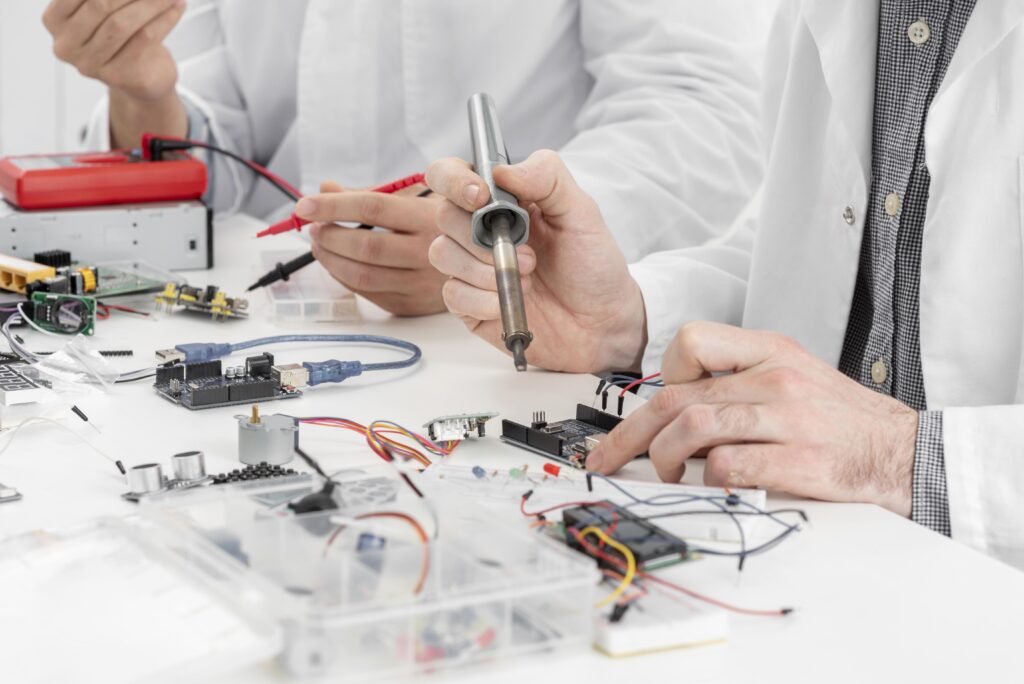The rapid development of technology has increased the scope of EEE and ECE. Both fields provide global recognition with high career opportunities and lucrative salaries.
Though sharing some similar characteristics, these fields differ in many aspects. Electrical and Electronics Engineering (EEE) handles the flow of raw power, while Electronics and Communication Engineering (ECE) focuses on information transfer through electronic devices.
Having a clear understanding of both fields will provide you with an idea of which course to choose that suits your interests. Let’s dive into a detailed exploration highlighting the differences between EEE Vs ECE.
EEE Vs ECE: The Differences
What is Electrical and Electronics Engineering (EEE)?

Electrical and Electronics Engineering gives a general overview of various applications of electricity. It gives us an understanding of the implementation of electrical systems in various environments and contains basic electronic knowledge and more power systems.
What is Electronics and Communication Engineering (ECE)?

On the other hand, electronics and communication engineering uses electricity to develop and design electronic devices and communication systems. It is similar to EEE, combining both electrical and electronic components, but ECE has a more significant emphasis on integrated circuits and communication systems.
Electrical and Electronics Engineering Vs Electronics Communication Engineering
Both EEE and ECE remain at par in electronic-derived branches, and many get confused because both these terms sound quite similar. Let us explore some points to delineate the differences between EEE and ECE;
1. Fundamental Principles
Both EEE and ECE deal with electrical and electronic systems; thus, they have most of their basic principles in common. However, these fields differ in areas of focus and applications.
Fundamental Principles of EEE
1. Electromagnetic Induction
To obtain an understanding of the workings of transformers, inductors, and all sorts of electrical machines, we must be familiar with the concepts of electromagnetic induction.
2. Power Systems
Power systems deal with the principles of generating power, as well as its transmission, distribution, and utilisation. This helps to understand grid systems, load flow, fault analysis, and stabilise power systems.
3. Electrical machines
Electrical machines deal with the design and operation principles of transformers, motors and generators to understand electromechanical energy conversion and machine dynamics.
4. Power Electronics
Power electronics require studying semiconductor devices for power conversion, including rectifiers, inverters, and converters.
Fundamentals Principles of ECE
1. Electronic Devices and Circuits
These would relate to the working of semiconductor components like diodes, transistors and the designing and analysing of circuits.
2. Communication Systems
It deals with information transmission, like voice, data, and video, across variable channels. These include wires, fibre optic cables, and radio waves.
3. Embedded Systems
Embedded systems focus on the interdependence of hardware and software design and real-time operating systems.
4. Digital and Analog Electronics
Analogue electronics deal with electronic circuits that deal with continuous-time, varying voltage signals, while digital electronics deal with electronic circuits that function by the operation of discrete voltage levels.
2. Applications
Both fields have a broad number of applications. EEE mainly specialises in the application of electrical power. ECE centres on electronics, communication and signal processing. As you can see below, both specialisations can play different, important roles in the same industries.
Applications of EEE
1. Power generation and distribution (Power systems)
EEE engineers are vital to designing and maintaining energy plants, substations, and distribution networks and enforcing renewable power systems and smart grids.
2. Control structures (Industrial Automation)
EEE engineers are crucial to implementing automated control systems for manufacturing processes, including Programmable Logic Controllers ( PLCs) and Distributed Control Systems (DCS).
3. Electric Vehicles and Railway Systems (Automotive and Transportation)
EEE experts are important in the development of electric propulsion systems, battery management, and charging infrastructure. They are also necessary to maintain electric systems for signalling and traction in railways.
Applications of ECE
1. Communication in Power systems
ECE engineers play a vital role in growing communication networks for smart grid technologies and implementing remote monitoring structures in smart grids.
2. Communication in Automation
ECE experts lay out communication protocols for industrial automation systems and develop wireless sensor networks for real-time monitoring.
3. Automotive Communication
ECE is crucial for the improvement of in-vehicle communication systems, like controller area networks (CAN) and vehicle-to-vehicle (V2V) communication. They are responsible for the implementation of Intelligent transport systems (ITS) for traffic tracking and control.
3. Career Pathways
The career path depends upon your interest in either the broader range of electrical systems and power-related fields (EEE) or on communication technologies and electronics (ECE).
Career pathways after EEE
1. Power Engineer
They are necessary to design, operate and maintain power generation and distribution systems. Power engineers are crucial for ensuring the reliability and efficiency of power supply.
- Industries: Power generation companies, utility companies and renewable energy firms.
- Average Base Salary: Rs. 3,00,000/- per year
2. Electrical Design Engineer
They are important in designing electrical structures for buildings, machinery, and automobiles. They are responsible for the production of electrical schematics and layouts.
- Industries: Construction, automotive, and consumer electronics
- Average Base Salary: Rs. 3,00,000/- per year
3. Renewable Energy Engineer
They design and develop sustainable energy systems, like solar, wind, and hydroelectric power. These engineers are necessary to carry out feasibility studies and enhance power solutions.
- Industries: Renewable energy firms, environmental consultancies and utility companies
- Average Base Salary: Rs. 4,00,000/- per year
Career Pathways after ECE
1. Telecommunication Engineer
They design and upkeep communication networks, like satellite and fibre optics and are vital for developing communication protocols and ensuring reliability.
- Industries: Telecommunication companies, satellite communication firms, and internet service providers.
- Average Base Salary: Rs. 3,48,000/- per year
2. Broadcast Engineers
These engineers are essential to maintain and develop broadcasting equipment for radio, TV, and online media.
- Industries: Media companies and entertainment industries
- Average Base Salary: Rs. 3,50,000 per year
3. Network Engineer
They design, implement and manage data networks like LAN, WAN, etc. They are responsible for maintaining network security and performance.
- Industries: IT enterprises and telecommunications
- Average Base Salary: Rs. 5,50,000/- per year
The Best College for EEE and ECE in Tamil Nadu: Mailam Engineering College
Mailam Engineering College (MEC) is an autonomous college in the Villupuram district of Tamil Nadu. It is one of the top engineering colleges for EEE and ECE courses in Chennai. In fact, MEC is the only engineering college with TCS accreditation in the Villupuram, Tiruvannamalai, and Cuddalore districts.
In the 2022-2023 academic year, we had a highly successful placement record of 87%. Our students were recruited by 108+ companies that were actively looking for competent engineering professionals.
Our Department of Electrical and Electronics Engineering works with the aim of providing students with a high-quality education that entrusts students with industry-standard tools to analyse, design, develop and test electronic-based systems.
MEC’s Electronics and Communication Engineering department holds the record of producing the highest number of ECE graduates in Chennai. Our department regularly applies and receives funds from AICTE and CSIR for projects and seminars, and it offers students ample knowledge covering almost all disciplinary areas of ECE.
Takeaway
Both ECE and EEE offer promising career prospects, driven by technological advancements and industry demands. EEE Vs ECE, While choosing between these two engineering disciplines, aspiring engineers should reflect on their interests and career objectives to ensure that they match the particular areas of focus and opportunities offered by each field.
MEC is the top institution in Tamil Nadu where average minds are transformed into skilled engineers. By providing high-quality with excellent placement records, MEC stands out as the best institution where you can pursue your EEE or ECE degree.
Join Mailam Engineering College to pursue your dream engineering degree!
FAQs
1. What are some advanced courses in EEE and ECE?
Advanced courses in EEE often cover power systems analysis, control systems, power electronics, high voltage engineering, power plant design, etc.
Advanced ECE courses include digital electronics, communication theory, signal processing, antenna design, network protocols, and VLSI design (Very Large Scale Integration).
2. What are the higher education opportunities after EEE and ECE?
After EEE, you can choose to study further with an M.S. or Ph.D in Electrical Engineering, Power Systems, and Renewable Energy.
After pursuing graduation in ECE, you can choose an M.S. or PhD in Electronics Engineering, Communication Systems and Signal Processing.
3. What are the main areas of focus of EEE and ECE?
EEE is more hardware-driven and relates to electrical systems and power electronics, while ECE is more innovation-driven and includes principles relating to the designing of electronic equipment and communication technologies.
4. Which field has a broader scope in terms of industry applications?
EEE has a broader scope in traditional industries like power manufacturing and infrastructure. ECE is more specialised in communication and electronics.
5. Can I switch from EEE to ECE during my studies?
It depends on the university’s policies, but switching from EEE may require catching up on specific courses unique to ECE.











